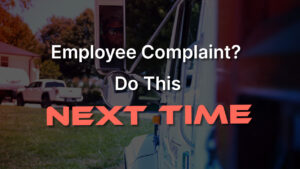How to Think About Overhead Expenses in a Landscape Contractor Company

Thinking about overhead expenses?
It’s winter time, and if you’re a landscaper, this is the time to plan, prep, and prepare for the upcoming season – especially when it comes to overhead expenses.
If you follow my blog, you know I’m writing a series on budgeting, planning, and projecting to ensure your business is set up with pricing that generates a profit in the upcoming year.
The first article was just general budgeting tips for contractors
The second article focused on how to deal with unbillable labor
This is the 3rd article in the series, and today I’m focusing on the overhead expenses portion of your budget. How to think about overhead expenses, how to plan for them, and how to make sure they don’t eat the profits right out of your landscape contracting company.
It’ll be a pretty simple concept and takeaway.
Let’s get into it.
The concept is, that every dollar you spend in your business that wasn’t budgeted for, what was supposed to be your profit goes to pay for it.
So the takeaway is, when building your budget, make sure that every dollar you spend on overhead expenses is accounted for.
And then some.
After I’ve documented every overhead expense I can think of, I like to even add a “fudge factor” line item that gives me some cash allocated for unexpected overhead expenses that I didn’t account for in the budget.
What is an overhead expense?
Real quick, let me just address what an overhead expense is.
An overhead expense is any bill you have to pay that is not directly related to a specific job. Meaning, whether you sell a job or not, you’ll have to pay this bill.
Things like insurance, marketing, vehicles, utilities, etc.
As opposed to direct expenses that are related to jobs. You only get those bills if you sell the job.
Things like pavers, stone, joint sand, plants, lights, etc.
If you don’t sell the job, you don’t pay those bills.
Common overhead expenses that get missed.
The types of overhead expenses like utilities etc that I mentioned above usually don’t get missed when sitting down to tally up everything your business needs to pay.
But here are some examples that commonly get missed:
Owner’s pay (the business’s profit is not your pay as the owner)
Unbillable labor (mentioned in last weeks article)
Increases in current overhead bills
Shop rent (even if you are working out of your own garage at home)
Equipment depreciation (read more here)
Little things like employee uniforms, donations, impulsive marketing spend, credit card processing fees, training and travel to shows, etc
What to do when building your budget
So, when you’re building or updating your budget, budget for worst-case scenario or on the high end for your overhead expenses.
Budget for overhead expenses that you think you might have in the future.
And when you’ve done all that, add a fudge factor on top of that yet.
Don’t let a single dollar slip out of the profit bucket and into the overhead bucket.
So when you bust your tail all year, working hard, cranking out some awesome work, you actually see the reward at the end of the year 😉.
If don’t use SynkedUP, and you’d like to dig in and have an expert look over your shoulder at your budget, schedule a free budget call with our team!
If you use SynkedUP, and want to dig into this and review your budget, book a call with our experts!
Cheers!
Weston Zimmerman

Weston Zimmerman
CEO and co-founder
See SynkedUP in action
Related Articles
Employee Complaint? Do This Next Time.
Employee Complaint? Do This Next Time. Had An Employee Complaint? Have you ever had an employee complaint? I’m sure you...
Are You “The Best” Contractor In Your Area?
Are You “The Best” Contractor In Your Area? “The Best” Can you make a better burger than McDonald’s? Can you...
Making Money? Time for the Mid-Year Check
Making Money? Time for the Mid-year Check Making money? It’s that time in the heat of summer again! Are you...
Improving Your Sales Skills Through Authenticity
Improving Your Sales Skills Through Authenticity Can you improve your sales skills? I was inspired to write this today from...
Feeling Resentment? Where Does It Come From?
Feeling Resentment? Where Does It Come From? Where does resentment come from? I was on a call last week with...
What Are You Putting Off?
What Are You Putting Off? What are you putting off? Today’s blog is a bit different. I’m zooming out, talking...
The Power of Job Costing
The Power of Job Costing The Power of Job Costing The power of job costing. It can mean the difference...
Pricing Estimates Profitably With An Updated Budget
Pricing Estimates Profitably With An Updated Budget Pricing estimates profitably with an updated budget It’s that time of year where...
Should Contractors Give Discounts?
Should Contractors Give Discounts? Should contractors give discounts? Should we as contractors give discounts on jobs? I dare say we’ve...
How to Create Estimating Templates and Production Rates
How to Create Estimating Templates and Production Rates Estimating Templates and Production Rates You want to cut estimating time by...









